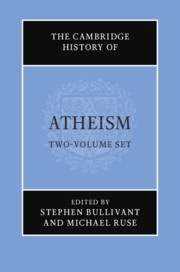Book contents
- The Cambridge History of Atheism
- The Cambridge History of Atheism
- Copyright page
- Dedication
- Contents
- Acknowledgments
- Contributors
- Introduction
- Part I Preliminaries
- Part II Atheisms in History
- Part III Reformation, Renaissance, Enlightenment
- Part IV Classical Modernity: Philosophical and Scientific Currents
- Part V Classical Modernity: Social and Political Currents
- Part VI Twentieth and Twenty-First Centuries: Intellectual and Artistic Currents
- 32 Analytic Philosophy
- 33 Naturalism
- 34 Existentialism
- 35 Atheism and Postmodern Philosophies
- 36 Ayn Rand and Objectivism
- 37 Darwinism
- 38 Literature
- 39 Music
- 40 Visual Arts
- 41 Film and Television
- Part VII Lived Atheism in the Twentieth- and Twenty-First Centuries: Case-Studies
- Part VIII Emerging Atheisms in the Twenty-First Century
- Part IX Conclusion
- Index
- References
34 - Existentialism
from Part VI - Twentieth and Twenty-First Centuries: Intellectual and Artistic Currents
Published online by Cambridge University Press: 25 September 2021
- The Cambridge History of Atheism
- The Cambridge History of Atheism
- Copyright page
- Dedication
- Contents
- Acknowledgments
- Contributors
- Introduction
- Part I Preliminaries
- Part II Atheisms in History
- Part III Reformation, Renaissance, Enlightenment
- Part IV Classical Modernity: Philosophical and Scientific Currents
- Part V Classical Modernity: Social and Political Currents
- Part VI Twentieth and Twenty-First Centuries: Intellectual and Artistic Currents
- 32 Analytic Philosophy
- 33 Naturalism
- 34 Existentialism
- 35 Atheism and Postmodern Philosophies
- 36 Ayn Rand and Objectivism
- 37 Darwinism
- 38 Literature
- 39 Music
- 40 Visual Arts
- 41 Film and Television
- Part VII Lived Atheism in the Twentieth- and Twenty-First Centuries: Case-Studies
- Part VIII Emerging Atheisms in the Twenty-First Century
- Part IX Conclusion
- Index
- References
Summary
“Existence precedes essence.” The French philosopher Jean-Paul Sartre would use this phrase to characterize existentialism and limit the extension of the term in his essay “Existentialism is a humanism,” which was first published in 1946. He had already used the phrase in his major work Being and Nothingness, originally published in 1943, but it is in the later work that he would use it to define the “movement.” This proposition is less of a doctrinal statement then it is a characterization of a way of thinking or of an attitude toward life.
- Type
- Chapter
- Information
- The Cambridge History of Atheism , pp. 616 - 631Publisher: Cambridge University PressPrint publication year: 2021



